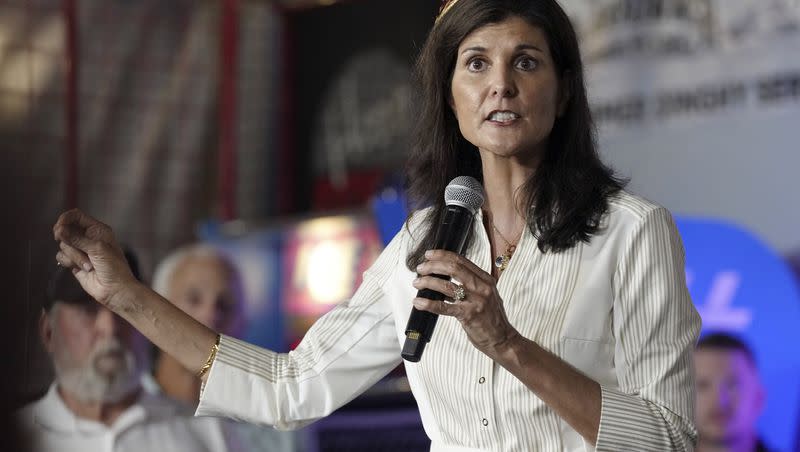‘None of these candidates’ projected to beat Nikki Haley in Nevada primary

- Oops!Something went wrong.Please try again later.
- Oops!Something went wrong.Please try again later.
- Oops!Something went wrong.Please try again later.
At a boutique hotel near the Las Vegas Strip, the Nevada Republican Club huddled for its monthly luncheon Tuesday. The opening speaker rattled off a list of this week’s hallmark events: the presidential caucuses on Thursday; the Lunar New Year on Saturday; the Super Bowl on Sunday.
“Let this be the year we take back our country,” the speaker declared.
Later, U.S. Senate candidate Sam Brown offered another distinction that made Tuesday special: it was Ronald Reagan’s birthday. His announcement was met with applause.
But at no point — not during the hourlong lunch, or the 40 minutes of speeches from Brown and presidential candidate Ryan Binkley, or the 20 minutes of question-and-answer — was there any mention of Tuesday’s “first-in-the-West” presidential primary taking place that day.
Nevada Republicans did their best to ignore the state-run primary, in which “none of these candidates” — an option on Nevada ballots — edged out Nikki Haley, the only major candidate participating in the primary. The Republican Party is hosting its own presidential caucus on Thursday, where Donald Trump will almost certainly be declared the winner and scoop up the state’s delegates.
In Tuesday’s Democratic primary, President Joe Biden and Vice President Kamala Harris won in a landslide, garnering nearly 90% of the vote.
Related
Instead of being enthused for Thursday’s caucus, most Nevadans seem to be utterly confused. Even those who plan on turning out for Trump on Thursday agree.
“It’s undeniably confusing,” admitted Ryan Hamilton, a candidate for the Clark County Commission who otherwise supports the caucus. “There’s a lot of confusion about how and when to vote,” added Flemming Larsen, a candidate for Nevada’s 1st congressional district.
When I asked Zach Guymon, a Las Vegas-based GOP strategist at Reformation Strategies, what to make of it all, he sighed. “Every election, I get hundreds of calls and texts asking, ‘who should I vote for?’” Guymon said. “This time, I have received an insane amount of calls with one question: ‘What the hell is going on?’”
Perhaps Republicans will be rewarded with record turnout Thursday, and all of the previous concerns will fade. Perhaps, more likely, a significant chunk of Republicans — having filled out the mail-in ballots sent them weeks ago, with Trump’s name missing — considered their duty done and gave no more thought to it.
Either way, the Nevada Republican Party managed to drive itself into irrelevance for the 2024 cycle. For decades, the state has battled to be the first-in-the-West — a proving-ground for presidential hopefuls, where candidates would come months in advance, jockey for support and flood the economy with TV ad buys and events. This cycle, Nevadans have seen a ghost town. No candidate besides Trump has visited since October.
In 2021, in an effort to secure Nevada as first-in-the-West, the state legislature passed a bill codifying an early February state-run primary. Two years later, the state GOP announced it would go ahead with its own exclusive caucus, requiring candidates to pay $55,000 to enter and barring them if they registered for the primary ballot. Skeptics accused the party of gaming the election to favor Trump; supporters claimed the party wanted control of its own nominee-selection process.
In October, Haley, Mike Pence and others registered for the state-run primary, forfeiting any chance at winning Nevada’s delegates. Trump, Ron DeSantis and others registered for the caucus.
All of that feels like ancient history now. Now, only three candidates are left in the race: Trump, who leads in national polls by a country mile; Haley, who’s honed in on winning her home state, South Carolina, later this month; and Binkley, the Texas businessman and pastor who barely registers in polls, but says he’s been divinely guided to stay in the race.
“We have not spent a dime nor an ounce of energy on Nevada,” said Betsy Ankeny, Haley’s campaign manager, on Monday. “We aren’t going to pay $55,000 to a Trump entity to participate in a process that is rigged for Trump. Nevada is not and has never been our focus.”
So, on Tuesday, it was Haley, facing off against “none of these candidates” and a handful of other longshot candidates. Nevadans would’ve liked to see her make some effort in the state. Some, like Jon Ralston, founder of The Nevada Independent, think Haley should have been playing for momentum, not delegates.
She should have run ads in Nevada and talked about “how Trump is so afraid of competing against her that he got the state party to set up a separate election,” Ralston wrote. Perhaps it would have been enough to earn Haley a victory, and come Thursday, when Trump wins the caucus, she could accuse him of fixing the caucuses to avoid embarrassment.
Others were less bullish about Haley’s motives. “Nikki Haley is clearly demonstrating that her goal is not to become the Republican nominee — it’s for something else,” Guymon said. “The name of the game is very simple: Delegates. You need to get as many delegates as possible.”

